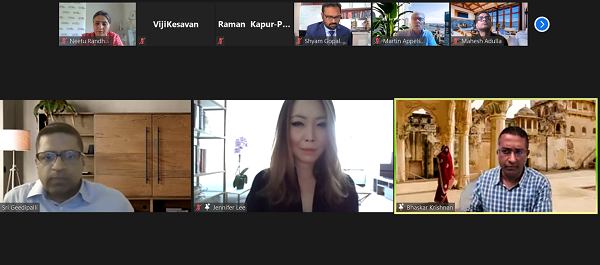TiE New Jersey Talks About Disruptive Fintech Ecosystem
New Jersey’s fintech ecosystem is being disrupted this year, and those disruptions are accelerating.
That’s good news, said Jennifer Lee, a principal at Edison Partners, in Princeton, and Bhaskar Krishnan, who heads the product and tech team for fintech at Rakuten (San Mateo, Calif.).
They gave their assessments earlier this month during a virtual gathering with members of TiE New Jersey. Also participating were moderator Srinath Geedipalli, managing director at Simanor (New York); Neetu Randhawa, executive director of TiE New Jersey, who organized the event; and Raman Kapur, TiE New Jersey president.
Fintech is really a synergy between finance and technology that enhances business operations, creating financial services that disrupt current technologies, Geedipalli said.
“What 2020 did is really forced that to be accelerated. Once everybody got locked down, everybody had to go digital,” Lee said. “I think everybody is seeing just how active all the different subverticals coming within fintech are.”
It is an exciting time for the industry for a lot of different reasons, they agreed. Asian markets have been witnessing a more rapid pace of disruption than the U.S. financial services industry, but “challenger banks” in the States are rapidly disrupting the status quo.
Developer platforms have played a major role in bringing fintech innovations to market faster, according to Krishnan. “About 60 percent to 70 percent of India’s and China’s mobile commerce is around fintech use cases, and a lot of cool things are happening there,” he said. “Coming back to the U.S., it was surprising for me to see how difficult it is to do simple things like money transfer and mobile payments. I think the U.S. is lagging severely in fintech, compared to not just India or China, but even countries like Vietnam, Indonesia or Malaysia, where there’s a lot of financial innovation,” he added.
“There have been hundreds of microcredit companies that have created alternative credit models. The U.S. is still very heavily focused on a clean, history-based credit model. In Asia, your bank doesn’t matter. Your behavior matters.”
Both Lee and Krishnan agreed that fintech companies, the broad investor base and corporate America cannot overlook social and privacy issues. They expect these issues to be a dominant factor in fintech’s market acceptance.
Amazon as a Fintech Disruptor
One major disruptor in the U.S. is Amazon, whose approach to unbundling financial services has been a big success, and now Amazon is as big a fintech firm as it is an e-commerce firm, said Krishnan. The company offers a variety of financial products, including payments, credit, and working capital for its consumers, merchants and vendors. Other firms are finally waking up and trying to replicate the model.
“So, you are going to see increasingly more people and more fintech companies across the entire commerce ecosystem going back to the embedded finance layer,” Krishnan said. “I’m actually quite excited about fintech platforms and ecosystems.”
Lee noted that, as fintech companies become leaders in specific segments of the financial services industry, they could start expanding into other synergistic financial businesses — akin to how legacy banking powerhouses developed. This time, however, technology will be at the core of any such growth.
Lee said, “We had an ambitious group of people [Amazon] who saw an inefficiency in the existing financial services. And they wanted to fix it. They started with a product, and really started to scale. That’s really what unbundling means. You can’t start with everything. You have to start with that one thing. In the Big Bang moment, you have to start there.
“That’s what that initial unbundling means. Again, I want to be very clear: none of this is new. That’s how companies always start. Now, over time, as these companies grow, some of them unfortunately may fail. Some of them unfortunately might just kind of stay small. And some might make it really big as they execute, as they grow, as they get customers,” Lee said.
“But I don’t care if it’s B2B [business to business] or B2C [business to consumer], you are filling certain niches. I think one of the really exciting things about fintech — and this alludes to the big addressable market that has exploded and will continue to explode – is the accelerating growth of financial services,” she added.
“The reason why fintech is so exciting, and one of the many reasons why it’s been such a hot area, with all these different trends coming out every single year and all these different focuses, is because it is so fundamental.”
“Disruption creates opportunities,” said Randhawa, who organized the event to help TiE New Jersey members interact with the industry leaders. “We want our members to be in the lead to exploit them.”
Kapur noted, “As we learned from Srinath Geedipalli, Jennifer Lee and Bhaskar Krishnan, the fintech ecosystem is going through massive disruption as it unbundles services and creates new services, using a range of new technologies such as blockchain.
“Great advice from Bhaskar to take a sliver of the market, focus on scaling it to create value-added and valuable new enterprises.”
Lee added, “I mentioned Amazon earlier. Fundamentally it is a fintech company with a lot of financial services that the company provides. It’s just mind boggling, right? And if you think about what that actually means, that is the backbone of everything that we do, like, that’s money.
“There’s a huge, massive part of the population that is still very much underserved by technology, and especially fintech,” Lee said. “That is absolutely one of the biggest opportunities out there within the fintech landscape, across the board. Period.”




